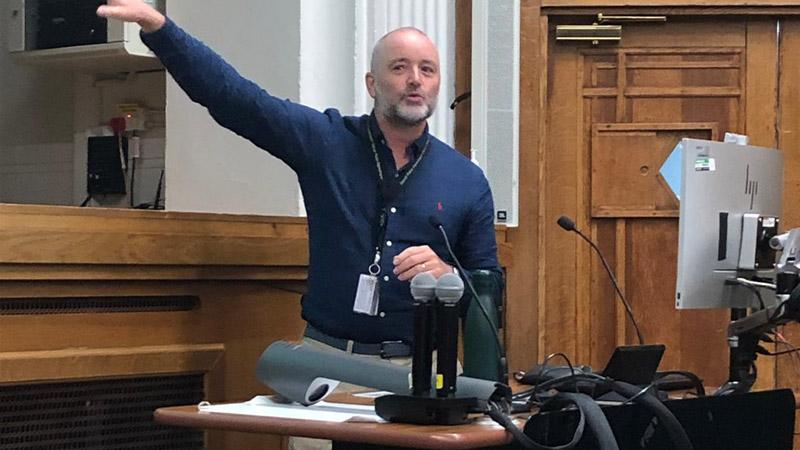Westminster Law School (WLS) hosted the first ever Westminster Policing Symposium in Portland Hall on the University’s Little Titchfield Street site on Monday 8 July, bringing together diverse academics to discuss issues arising from conducting police research in the UK and internationally. The event was one of a series, marking the first year of police education and research at Westminster Law School after launching the Policing BA Honours course.

The Head of WLS Professor Luke Mason kicked off the event by giving a warm welcome to the attendees, and explained why the University has made a strategic investment in policing education and research. The day was devoted to Policing Research: Troubling Present, Reimagined Futures, in which academics from all stages in their careers across various universities described their experiences on problems arising from conducting police research in the UK and globally. They covered a range of police and crime-related research subjects concerning research agenda-setting, access to data, research funding and intellectual property agreements.
Senior Lecturer and Course Leader of the Policing BA Honours course and author of the recently published book Critiquing Evidence-Based Policing in Britain: A Genealogy Dr Paul Betts was joined by Dr Julian Hargreaves from City, University of London, and Professor Marleen Easton from the University of Ghent, to discuss the growth of evidence-based policing and concerns for more progressive models of policing that arise from this trend.
Tiggey May and Nicola Campbell from Birkbeck, University of London, presented their work on Operation Soteria and how they enable forces to revolutionise how they address rape and serious sexual offences (RASSO). Professor Goran Larsson from the University of Gothenburg was joined by Dr Marianne Wade from the University of Birmingham, and retired Deputy Chief Constable Richard Moore, to discuss the impact of religion and migration in police work, highlighting factors of public trust in the police and citizenship as an approach to progressive policing. Moreover, Senior Lecturer in Social Sciences at Westminster Dr Shamila Ahmed engaged on the topic of a multi-agency response to the policing crisis and hate crime.
The afternoon session was an hour-long facilitated discussion workshop designed to bring academics together to address the problems with current dominant approaches and create space for new ones. It also aimed to reimagine and discuss ways that critical and pertinent policing research might be conducted in the future.
Dr Paul Betts said: “The symposium was a landmark event in this journey, attracting credible scholars from a range of European jurisdictions and institutions to debate policing, the production of knowledge about policing and how these might be best situated to ensure policing can become transformed and become more progressive. The event was a tremendous success, with a vibrant exchange of ideas and perspectives on policing issues across a range of subjects and countries. There are lots of opportunities for international research collaboration emerging from the symposium, and a commitment to make it an important annual event in Westminster and policing research calendars. My thanks to the team involved in pulling the event together, our wonderful presenters, discussants and attendees.”
He added: “Our ground-breaking BA (Hons) Policing programme is now open for entry in September 2024. Alongside delivering core professional training, we aim to educate the future leaders of policing and the wider criminal justice system with critical thinking skills, and exposure to new ideas about how policing needs to be reformed.”
This event directly contributes to the United Nations Sustainable Development Goal (SDG) 4: Quality Education. Since 2019, the University of Westminster has used the SDGs holistically to frame strategic decisions to help students and colleagues fulfil their potential and contribute to a more sustainable, equitable and healthier society.
Find out more about the new Policing BA Honours course.







